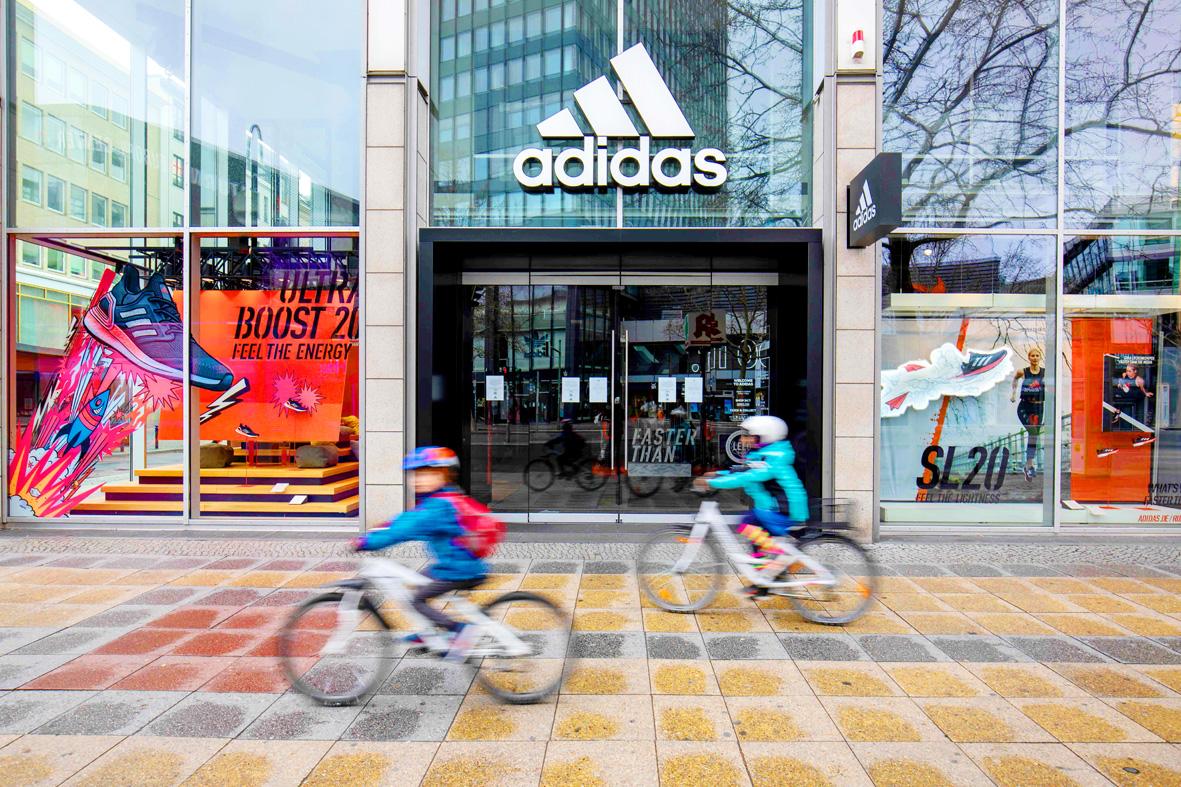Global retailers, including Adidas AG and Hennes & Mauritz AB (H&M), sparked outrage in Germany on Sunday after announcing they planned to stop paying rent on stores that have been forced to close over the coronavirus outbreak.
German Minister of Finance Olaf Scholz urged leading companies to refrain from taking rash action that could hurt property owners.
“It’s irritating when large companies simply announce a halt on paying rent,” Scholz told the Bild daily, urging retailers to reach out to landlords to find solutions.

Photo: AFP
“Now is the time to work together,” he said.
The move came after the German government unveiled a major rescue package to protect companies and jobs from the economic impact of the pandemic.
It includes a provision that temporarily shields tenants from being kicked out of their homes or business premises if they experience financial hardship over the coronavirus measures.
However, German Minister of Justice Christine Lambrecht said company bosses should not to take advantage of the measure.
“It is indecent and unacceptable if financially strong firms now just stop paying their rents,” she said in Berlin on Saturday.
German sportswear maker Adidas, which made a net profit of nearly 2 billion euros (US$2.2 billion) last year, has been hard hit by a slump in Chinese sales and massive store closures.
The company, one of Germany’s best-known brands, told Deutsch Presse-Agentur (DPA) that it was “temporarily suspending rental payments, just like many other companies.”
German Minister of Transport and Digital Infrastructure Andreas Scheuer said he was “disappointed by Adidas,” pointing out that many small landlords would be left out of pocket.
German Member of the European Parliament Katarina Barley tweeted that she had bought her last pair of Adidas trainers, in a post that received more than 9,000 likes.
However, the Bavarian giant hit back, with chief executive Kasper Rorsted telling yesterday’s edition of the Frankfurter Allgemeine Zeitung that the bulk of Adidas’s German landlords were “large real estate companies and insurance firms” who had “mostly shown understanding” for the rent freeze decision.
Adidas would continue to make payments to small private landlords, he said.
“They will receive their April rent as usual,” he said.
Swedish clothing giant H&M likewise said it would not be paying rent on its 460 or so closed stores in Germany, telling DPA that it had informed landlords and hoped to find “a mutually acceptable solution” soon.
German shoe store chain Deichmann SE intends to suspend rent and service charges from next month for the duration of the government-ordered closures.
A spokesman for the Essen-based company told DPA that it expected those with political responsibility “to compensate for the lost rental income of the affected parties.”
Other German media outlets reported that electronics retailers Media Saturn Holding GmbH and MediaMarkt as well as Adidas rival Puma AG also planned to halt their rent payments for now.
The Ceconomy group that owns Saturn and MediaMarkt on Sunday said that it intended to apply for state aid to weather the coronavirus crisis.

Intel Corp chief executive officer Lip-Bu Tan (陳立武) is expected to meet with Taiwanese suppliers next month in conjunction with the opening of the Computex Taipei trade show, supply chain sources said on Monday. The visit, the first for Tan to Taiwan since assuming his new post last month, would be aimed at enhancing Intel’s ties with suppliers in Taiwan as he attempts to help turn around the struggling US chipmaker, the sources said. Tan is to hold a banquet to celebrate Intel’s 40-year presence in Taiwan before Computex opens on May 20 and invite dozens of Taiwanese suppliers to exchange views

Application-specific integrated circuit designer Faraday Technology Corp (智原) yesterday said that although revenue this quarter would decline 30 percent from last quarter, it retained its full-year forecast of revenue growth of 100 percent. The company attributed the quarterly drop to a slowdown in customers’ production of chips using Faraday’s advanced packaging technology. The company is still confident about its revenue growth this year, given its strong “design-win” — or the projects it won to help customers design their chips, Faraday president Steve Wang (王國雍) told an online earnings conference. “The design-win this year is better than we expected. We believe we will win

Chizuko Kimura has become the first female sushi chef in the world to win a Michelin star, fulfilling a promise she made to her dying husband to continue his legacy. The 54-year-old Japanese chef regained the Michelin star her late husband, Shunei Kimura, won three years ago for their Sushi Shunei restaurant in Paris. For Shunei Kimura, the star was a dream come true. However, the joy was short-lived. He died from cancer just three months later in June 2022. He was 65. The following year, the restaurant in the heart of Montmartre lost its star rating. Chizuko Kimura insisted that the new star is still down

While China’s leaders use their economic and political might to fight US President Donald Trump’s trade war “to the end,” its army of social media soldiers are embarking on a more humorous campaign online. Trump’s tariff blitz has seen Washington and Beijing impose eye-watering duties on imports from the other, fanning a standoff between the economic superpowers that has sparked global recession fears and sent markets into a tailspin. Trump says his policy is a response to years of being “ripped off” by other countries and aims to bring manufacturing to the US, forcing companies to employ US workers. However, China’s online warriors